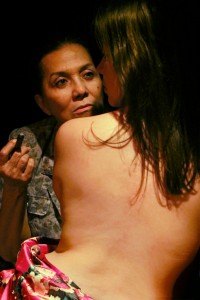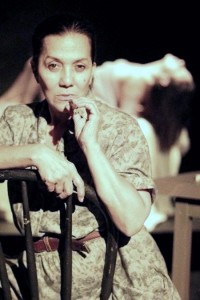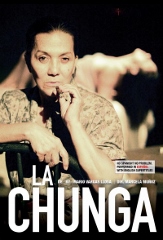MISSING MECHE
Although Nobel Prize-winning writer Vargas Llosa is known primarily as a novelist, he has also written nine plays spanning a period of sixty years. La Chunga,written in 1986, is the fourth. Its 1945 setting in the city of Piura, Peru, founded by conquistador Francisco Pizarro in 1532, gives the play a somewhat nostalgic character, as if it were a place that time had forgotten. The inhabitants seem only to drink, throw dice and visit the brothel Casa Verde. No reference is made implicitly or explicitly to the concurrent world war.
La Chunga centers on a female bar owner of indeterminate age (the title character); four self-styled “superstuds” (José, El Mono, Josefino, and Lituma) who frequent her establishment; and the mysterious Meche, low-life Josefino’s latest squeeze. One evening Josefino loses all his money to El Mono and sells Meche to La Chunga for  the night in order to stay in the game.
the night in order to stay in the game.
What is going on here? La Chunga is obviously taken by the girl, but claims not to be a lesbian; she values her independence too highly to be beholden to anyone. Josefino, ironically, is anything but fine and gentlemanly. Meche is too naïve and submissive to see how sorely she is being taken advantage of. And José, El Mono, and Lituma are too excited and intrigued to try and put a stop to it.
The next day Meche is nowhere to be found. What happened to her? La Chunga won’t say, but each of the “superstuds” has his own theory, which reveals more about himself and his desires than about Meche. Vargas Llosa never does reveal her fate. Instead, he paints incredibly vivid, by turns disturbing and poignant, portraits of each of his characters, letting us draw our own conclusions.
An intriguing study of human nature, La Chunga presents certain challenges due its frequent flashback and fantasy sequences. Director Marcela Muñoz renders such sequences easily comprehensible by using a kind of freeze-frame technique and a deft mixture of set and lighting design, which places some scenes behind a sheer curtain that can be illuminated or not as needed.
 As the titular La Chunga, Rosario Vargas gives a compelling, yet understated performance that is every bit as baffling as her character. Meche is delicately played by Erica Cruz Hernández, but with perhaps with too much innocence and not enough of the seductive charm that her role seems to call for. Among the “superstuds”, Marcopolo Soto’s El Mono manically lives up to his name by literally monkeying around: hopping up and down from his chair and laughing hysterically.
As the titular La Chunga, Rosario Vargas gives a compelling, yet understated performance that is every bit as baffling as her character. Meche is delicately played by Erica Cruz Hernández, but with perhaps with too much innocence and not enough of the seductive charm that her role seems to call for. Among the “superstuds”, Marcopolo Soto’s El Mono manically lives up to his name by literally monkeying around: hopping up and down from his chair and laughing hysterically.
La Chunga auspiciously marks the beginning of Aguijón Theatre’s twenty-fifth anniversary season, which continues with Carlos Fuentes’ OrquÃdeas a la Luz de la Luna and Federico GarcÃa Lorca’s La Casa de Bernarda Alba. This small store-front theatre in a predominantly Hispanic neighborhood provides English supertitles as an aid and enticement to non-Spanish speakers. It is a challenging and enjoyable cultural experience not to be missed.
photos by Oliver Aldape
La Chunga
Aguijón Theater, 2707 N. Laramie Ave.
Thurs – Sat at 8; Sun at 6
scheduled to end on November 16, 2014
for tickets, call 773-637-5899 or visit www.aguijontheater.org
for info on other Chicago Theater, visit www.TheatreinChicago.com
